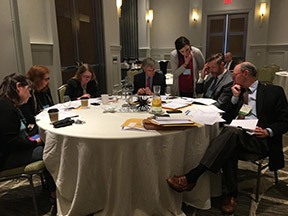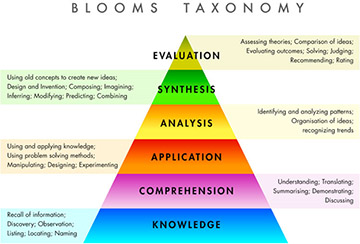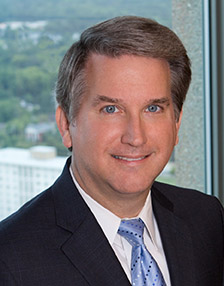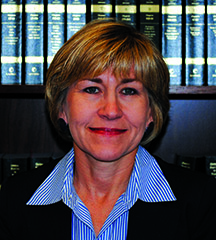June 2018 Newsletter
Specialization Exams — A “Behind the Scenes” Look
 Writing good exam questions may seem easy, but in fact, specialty committee members spend hours learning how to create valid and reliable exams and how to write exam questions that differentiate examinees. Committee members, pictured below, meet annually with Dr. Devdass Sunnassee, a professor in the Education Research Methodology Department at the University of North Carolina at Greensboro, and several graduate students to prepare and update the specialty exams each year. Dr. Sunnassee functions as a psychometrician, an expert in exam development and statistics, and guides the committee members as they seek to continually improve the exam process.
Writing good exam questions may seem easy, but in fact, specialty committee members spend hours learning how to create valid and reliable exams and how to write exam questions that differentiate examinees. Committee members, pictured below, meet annually with Dr. Devdass Sunnassee, a professor in the Education Research Methodology Department at the University of North Carolina at Greensboro, and several graduate students to prepare and update the specialty exams each year. Dr. Sunnassee functions as a psychometrician, an expert in exam development and statistics, and guides the committee members as they seek to continually improve the exam process.
Through these meetings, our specialty committee members have learned several new concepts about the test development process including:
Reliability: The degree to which test scores are consistent and stable across exam questions, versions of the exam, or exam administrations.
Validity: The degree to which the test measures what it is intended to measure.
Fairness: Test performance should not be influenced by extraneous factors of the test administration and/or examinee characteristics.
With these guidelines in mind, committee members gather to edit current exam questions, draft new questions as needed, and ensure that the exam covers subject matter in proportion to a typical law practice in that specialty area. This includes looking at a particular legal issue in terms of its relevance, frequency, and importance to the practice. The board specifies that “the examination should not test on laws or procedures that are seldom encountered by a lawyer who is substantially involved in the specialty.”
In addition, committee members try to draft questions that use higher-order thought rather than rote memorization. Specialty certification exams include questions that require application, analysis, synthesis, and evaluation. See Blooms Taxonomy (a model used to classify educational learning objectives into levels of complexity and specificity) below:

The primary goal of the test development process is to prepare an exam that is valid, fair, and reliable for use in certifying lawyers as specialists. The Board of Legal Specialization states that each examination should assess proficiency/competence, not mastery.
Proficient means well advanced in an art, occupation, or branch of knowledge.
Competent means having the requisite abilities or qualities; or having the capacity to function or develop in a particular way.
The board’s objective is to avoid certifying a lawyer who is unable to perform proficiently in the specialty area. In assessing this risk, the board must take into account the types of issues that generally arise in the specialty practice, the frequency that such issues arise, the danger to the client of a lawyer’s misunderstanding of the issues, and the general level of knowledge of those lawyers who are substantially involved in the area of practice.
The specialty exams are an integral part of the certification process. When used in conjunction with the other standards of substantial involvement—continuing legal education and peer review—specialty certification serves its dual purpose of 1. identifying lawyers who have demonstrated special knowledge, skill, and proficiency, and 2. improving the competency of the Bar.
If you would like information about joining a specialty committee, please notify Denise Mullen.
Spotlight: Gray Styers
Board Certified Specialist in Utilities Law
 What led you to become a lawyer?
What led you to become a lawyer?
I was a governor’s page for then-Governor Jim Hunt, and later an intern in the NC Department of Commerce, and saw how attorneys served as leaders both in my home town of Hickory and in Raleigh. I wanted to have a career that enabled me to make a difference in the lives of others and to improve the communities in which I lived and worked. To me, the legal profession, at its core, appeared to be a calling to service.
What made you decide to pursue certification?
Utilities law, technology, and regulated markets are rapidly changing. I spend a lot of time staying abreast of those changes, and the specialization designation reflects those nonbillable hours and efforts. Regardless of the area of law, I feel that lawyers should engage in lifelong learning so that they can stay current and are well qualified to serve their clients’ needs.
What do see as the benefits of achieving this goal?
There are several benefits. First, preparing for and taking the exam helped hone my knowledge and understanding of the applicable statutes and regulations, and I thought it was a good assessment of my own skills. Second, I like attending the State Bar Specialization events at which I can meet and exchange ideas with my colleagues who are also specialists in the area. Lastly, in this age of increased specialization, it can distinguish my practice and signal to existing and potential clients that I am experienced and knowledgeable in this area of the law.
What is it like to work with clients seeking assistance with utilities law issues in Raleigh?
I’ll admit it—I’m a policy wonk, and I love wrestling with big-picture policy issues. Every time someone turns on a light switch, a water faucet, or a natural gas stove, the rates that they pay and the quality of service they receive are, in part, a function of utilities law decision. I sincerely believe that governmental agencies can protect and advance the public good, and I like helping clients navigate the complicated intersection of business decisions and public policy.
In what activities/volunteer groups are you involved?
I have always been a history buff and am currently vice-president of the North Carolina Museum of History Associates. I served for many years on the Board of Directors of Big Brothers and Big Sisters. I have been active at Raleigh Moravian Church. In the Bar, I have served as president of the Wake County Bar Association and on the Board of Governors of the North Carolina Bar Association.
Who are your role models and why?
I have been fortunate to have many role models. My father worked 35 years in public education. He instilled in me a commitment of public service and helping others. Governor Jim Hunt’s leadership at the state level was very much an inspiration and motivation for me to come to Raleigh. I have also learned so much about the practice of law from my mentors and colleagues at the firms where I have been privileged to work—at Kilpatrick Townsend, Blanchard Miller, and now at Smith Moore Leatherwood.
Specialization Exams — A “Behind the Scenes” Look
 Alice Neece Mine will leave her role as director for the Board of Legal Specialization to assume the position of executive director for the North Carolina State Bar, effective late this year when current Executive Director L. Thomas Lunsford II retires. Alice has served as the director of the specialization program for the 25 years that she has worked at the State Bar. The board recently presented Alice with a Resolution of Appreciation noting her wise counsel, marketing savvy, and tenacious promotion of board certification for lawyers. Under her leadership, seven new specialty practice areas were launched and the program topped 1,000 specialists in 2016. Alice’s consummate professionalism; thoughtful and diplomatic approach to difficult issues; championship of the specialization board members, committee members, and staff; and unwavering support of board certification for lawyers as the hallmark of professionalism, will be missed greatly. Please wish her well in her new role.
Alice Neece Mine will leave her role as director for the Board of Legal Specialization to assume the position of executive director for the North Carolina State Bar, effective late this year when current Executive Director L. Thomas Lunsford II retires. Alice has served as the director of the specialization program for the 25 years that she has worked at the State Bar. The board recently presented Alice with a Resolution of Appreciation noting her wise counsel, marketing savvy, and tenacious promotion of board certification for lawyers. Under her leadership, seven new specialty practice areas were launched and the program topped 1,000 specialists in 2016. Alice’s consummate professionalism; thoughtful and diplomatic approach to difficult issues; championship of the specialization board members, committee members, and staff; and unwavering support of board certification for lawyers as the hallmark of professionalism, will be missed greatly. Please wish her well in her new role.